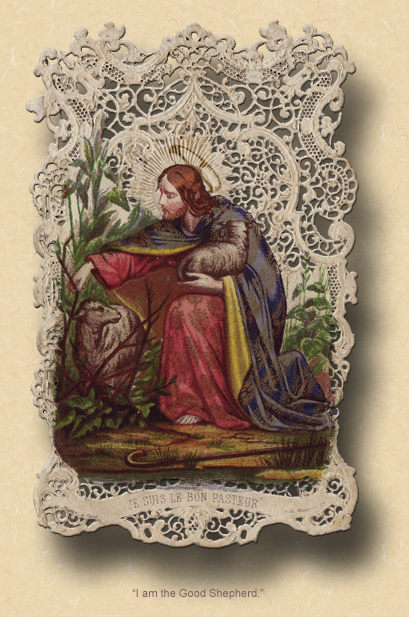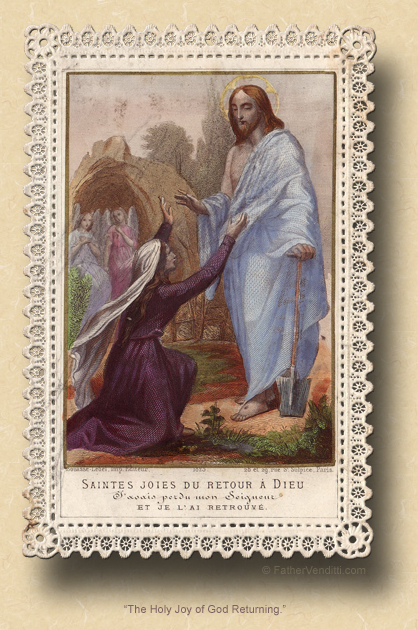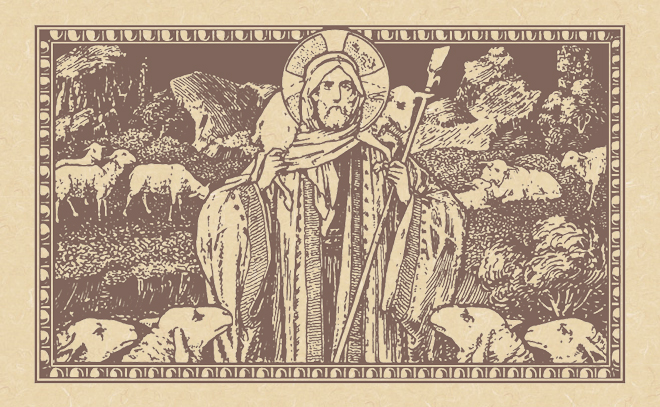Follow Me.
The Third Sunday of Easter.
Lessons from the tertiary dominica, according to the ordinary form of the Roman Rite:
• Acts 5: 27-32, 40-41.
• Psalm 30: 2, 4-6, 11-13.
• Revelation 5: 11-14.
• John 21: 1-19 or 1-14.
Good Shepherd Sunday.
Lessons from the dominica,* according to the extraordinary form of the Roman Rite:
• I Peter 2: 21-25.
• [The Gradual is omitted.]
• John 10: 11-16.
The Sunday of the Myrrh-Bearers; and, the Feast of the Holy Martyrs Terence, Pompey & their Companions.
Lessons from the pentecostarion, according to the Ruthenian recension of the Byzantine Rite:
• Acts 6: 1-7.
• Mark 15: 43—16: 8.
FatherVenditti.com
|
8:58 AM 4/10/2016 — I can only surmise that the reason the Roman Missal presents lessons on these early Sundays of Easter that were read previously on various weekdays is the presumption that the Sunday crowd is different from the weekday crowd—either that, or the assumption is that there is no homily on weekdays. Neither is the case here; so, for many of you, this will be a retrospective of sorts.

Our first lesson today is the culmination of a series of weekday lessons which began back during Easter Week itself, with the Blessed Apostles Peter and John curing a cripple, preaching the resurrection, and being arrested for the effort. The members of the Sanhedrin who arrest them have every reason to be concerned: after all, they are the ones who handed our Lord over to Pilate and bribed a couple of Roman guards to pretend that someone stole the Body to explain why the tomb was empty. They knew that Peter and John hadn't really broken any laws and that they had no legal basis on which to hold them, so they tried to convince them that they'd be happy to let them go if only they would stop preaching the resurrection. In the lengthy narrative from Acts in which Saint Luke records Peter's response we have the first theological explanation of the resurrection of Christ; but, what's more important about that episode is the reason Peter gives why he cannot do as they ask:
So they called them in, and warned them not to utter a word or give any teaching in the name of Jesus. At this, Peter and John answered them, “Judge for yourselves whether it would be right for us, in the sight of God, to listen to your voice instead of God’s. It is impossible for us to refrain from speaking of what we have seen and heard” (Acts 4: 18-20 Knox).
That last sentence has to be understood in the light of last Sunday's Gospel, in which our Risen Lord tells Thomas, “Blessed are those who have not seen yet have believed”; the point being that Peter and John didn't believe and preach the resurrection of Christ because of any intellectual conviction, nor was it on the basis of some emotional experience;  they preached the resurrection for the simple reason that they had seen our Lord alive! “It is impossible for us to refrain from speaking of what we have seen and heard.” The challenge that the Apostle's words hold up to us is that of reproducing for ourselves, though the virtue of Faith, that same certainty. they preached the resurrection for the simple reason that they had seen our Lord alive! “It is impossible for us to refrain from speaking of what we have seen and heard.” The challenge that the Apostle's words hold up to us is that of reproducing for ourselves, though the virtue of Faith, that same certainty.
Which brings us to today's Gospel lesson, which is also a repeat, but with some verses added to the end of it, and which requires us to do a little review.
There are three occasions on which our Lord appears to his disciples after rising from the dead, each one being recorded in only one Gospel, and not mentioned by any of the others. The first is our risen Lord's encounter with the disciples on the road to Emmaus, during which the two disciples our Lord meets fail to recognize Him, and at the end of which He offers Holy Mass for them then promptly vanishes since the presence of the Blessed Sacrament makes His human manifestation superfluous; and, we used that episode to emphasize the fact that the Blessed Eucharist is, in reality, our Blessed Lord in every respect. The second is His first meeting with His own Apostles in Jerusalem, who do recognize Him, during which He does not offer Holy Mass because the Apostles are priests and don't need Him to do that for them; and, we used that occasion to explain the unique relationship our Lord has with His priests. Both of those episodes came from Saint Luke. Today's episode is another one found only in one Gospel, and this time it's from John, and it's the one that I've referred to as the “clam bake” episode.
The reason they don't recognize our Lord on this occasion in spite of being priests is simple enough: they are gathered together on the beach at night, and Saint John tells us that they are approached by our Lord just as day is breaking; so, it's dark out, and they're just not seeing Him clearly. Nothing more than that. But remember, we're dealing here with Saint John. Nothing in John's Gospel is without meaning; even the most minute details speak something of importance. His Gospel begins, remember, with an interplay between light and darkness; man is born into darkness and Jesus is the Light which has come into the world. So, what time is it when this scene opens? It's night. And where exactly is this beach where they're having this all-night clam bake? It's by the Sea of Tiberias. This isn't Saint John just giving us a reference point on a map. We've been on this beach before. Look at who John says was there: Peter, Thomas, Nathaniel, and the sons of Zebedee, James and himself. This is the very beach where He met all these people for the first time three years before. This was the very beach where He commandeered Peter's boat to preach to the crowds on the shore, performed the miraculous catch of fish, and told Peter he would become a fisher of men, after which he and his two partners, James and John, went off with Him, leaving poor old Zebedee to clean the nets by himself (cf. Luke 5: 1-11). And here they are, back on this very same beach, in the middle of the night. “Master, we have worked hard all night,” Simon said to Jesus at their first meeting three years ago, “and have caught nothing…” (Luke 5: 5).
And here they are, all over again. Even after having spent three years with our Lord, even after suffering through the Passion with Him, they're back on this very same beach, relapsing into their old ways. And is that not so often the story of our own spiritual journey? We have our moments of enlightenment, in which we are filled with love for our Lord and fervor for our faith, when we are so on fire with apostolic zeal that we want to go out and convert the world; then the next thing we know we're back right where we started, lethargic in our efforts, tepid in our faith, almost as if it never happened. We come out of confession firmly resolved to change and turn over a new leaf, then find ourselves back again with the same old sins. It's our fallen nature. In the case of the Apostles, even the Holy Priesthood didn't make them immune to it.
But rather than become discouraged at this, we should notice how our Blessed Lord responds. What does He do when He finds His apostles in this dejected state on the beach where they first met, just as the sun is rising in the east? The very same thing He did three years before: He repeats the miraculous catch of fish. The message couldn't be clearer: it doesn't matter how many times we fall, or how far; it doesn't matter that we confess the same sins all the time; it doesn't matter if we have these alternating periods of zeal and apathy. Jesus will perform the miraculous catch of fish as often as we need it.
On both occasions—when they first met Him in Jerusalem and in this episode where they meet Him for the third time after His resurrection—as long as they labored at night, apart from our Lord, they labored in vain. In the absence of Christ, every day is an empty night, and everything we do is useless; but, when we labor side by side with our Blessed Lord, night becomes day, and everything we do bears fruit, because everything we do is really done by Christ working through us.
All of this some of you have heard before, and I will repeat the same question I had asked: why are so many of our Lord's apostles fishermen? Why was our Lord was so particularly attracted to men who made their living on the sea? I think it might be because, to be a commercial fisherman, you have to have patience.*  Long hours of waiting throughout the night, casting your nets again and again and again, sometimes catching something and sometimes not. There's never a guarantee of success, but there is certainly a guarantee of failure if you give in to discouragement and stop casting your net. Long hours of waiting throughout the night, casting your nets again and again and again, sometimes catching something and sometimes not. There's never a guarantee of success, but there is certainly a guarantee of failure if you give in to discouragement and stop casting your net.
Which brings us to the extra verses that have been added to this passage for today. Why does our Lord ask Peter three times whether he loves Him? The Fathers of the first three centuries, who were always looking in the Gospels for poetic symmetry, said it was to make amends for the fact that Peter had denied our Lord three times, and that makes sense. At the Last Supper, Peter had protested to our Lord that he would never betray Him, that he would in fact lay down his life for Him. He didn't on the night of Good Friday, but that was by our Lord's own design because Peter had important things to do first: he needed to defend the resurrection of Christ before the Sanhedrin, he needed to guide the establishment and organization of the early Church in Jerusalem, he needed to preside over the Council of Jerusalem and confirm the Apostle Paul's mission to the Gentiles, he needed to go to Rome and plant the seed of the faith in the heart of an empire that would one day take the Gospel to the farthest ends of the earth.
At the end of the passage, after recording our Lord's cryptic sounding prophesy to Peter about being led where he will not go and having his arms stretched out, John mentions in an editorial comment that it was said to signify the manner in which Peter would die, but this was not because John was clairvoyant. Keep in mind that, at the time John is writing all this from his exile on the Island of Patmos, Peter had already been crucified on the Vatican Hill; his Gospel is a reflection on the whole spectrum of events he witnessed as a young man, and which he's recalling from memory in his old age and been praying about for many years. The Book of Revelation, which he wrote shortly after this, and from which our second lesson today was taken, was the same thing. The take-away of all of this for us is the simple fact that nothing really worked out the way Peter had envisioned, assuming he envisioned anything at all. But the fact that Peter was being led point by point, to one event after another which seemed to him totally disconnected and unrelated in his own mind, didn't mean that there wasn't a plan.
There was, but it was a plan only in the Mind of God, and John's Gospel is the blueprint of that plan, the narrative of which begins with the Son of God existing from all eternity and coming down to earth, and which ends with this episode on the beach; but the clam bake is not the end of the story, and certainly not the end of the plan, as we know. It was, in fact, only the beginning, and it's not over yet, because we have yet to write our stories into the narrative. We are doing it now, we just don't realize it. And when we find ourselves in Peter's shoes, seeming to be led from one event to another, from one crisis to another, from one difficult decision to another, from one confusing dilemma to another, perceiving ourselves lost in some chaotic maze of total incoherency, that doesn't mean there's no plan. There is. It's just not our plan, and that's why we can't see it.
So, what do we do? It's very simple, really. We do what our Lord told Peter in the very last two words of today's Gospel lesson: “…and with that he said to him, 'Follow me'” (John 21: 19 Knox).

* Cf. Msgr. Ronald A. Knox, Sermon on the Feast of Ss. Peter & Paul, June 29, 1947.
|

